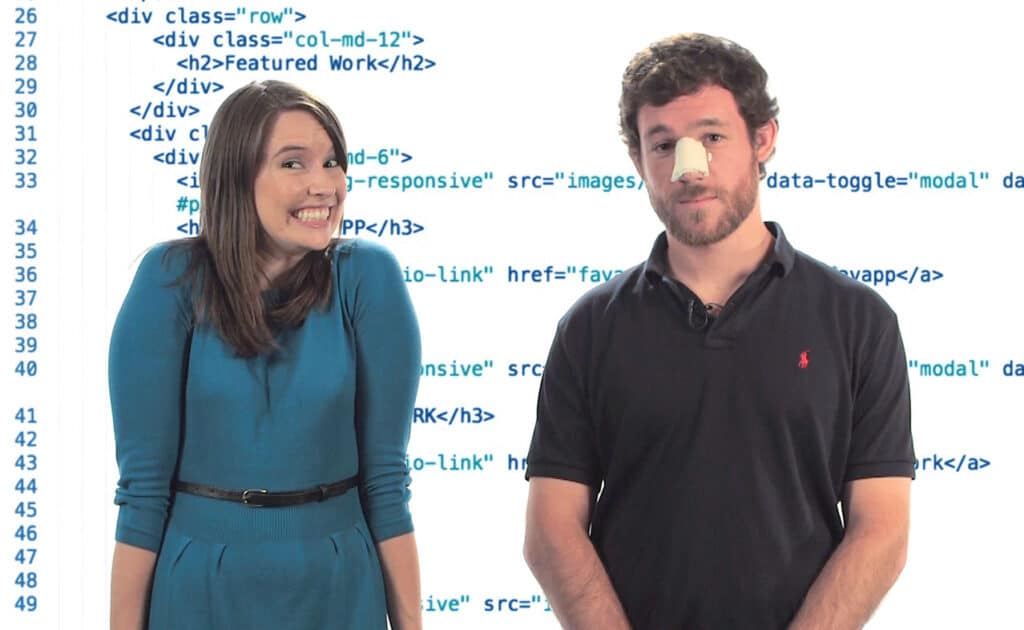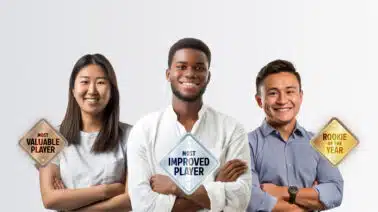Find the right nanodegree program for you.
Start Learning

From the day I first joined Udacity, I have been deeply impressed by the extent to which my colleagues self-identify as educators. At heart, Udacity really is a company of teachers. So writing about our courses is one of my favorite activities, and probably needless to say, new courses excite me like a child on a holiday morning!
It’s accordingly a real pleasure to introduce you to some new offerings. These courses run from Beginner, to Intermediate, to Advanced, and they cover a wide range of topics, but they’re all united by two things: 1) they’re free, and 2) they’re all taught by wonderful teachers.
Let’s begin with the beginners …
New Beginner Courses
1. Writing READMEs
Because Code is for Humans, Too
If you detect a certain personalized “flavor” in that subhead, it’s likely because this course is taught by Walter Latimer, one of Udacity’s most outgoing, community-calibrated, energetic and energizing educators. When he’s not deep into his role as Curriculum Director for our Ruby Programming Nanodegree program, you can find him right here in this course, teaching you (and thousands of other enrolled students) how to write well-structured READMEs that enable others to “make meaning of our code.”
2. Engagement & Monetization | Mobile Games
How to make Money with your Games
Game developers, take heed! This course has a mantra, and it’s one you should internalize ASAP: “Monetization should be built into the fabric of a game from the beginning.” This is the core premise from which this course proceeds, and the overarching course goal is to teach you how to design games that produce sustainable revenue for the long-term.
This course benefits from the contributions of two wonderful teachers. The first is Ankur Prasad, who is currently Head of Growth Marketing, Amazon Appstore. Alongside Ankur is our own Cezanne Camacho. Cezanne holds an MS in Electrical Engineering from Stanford, but says she fell in love with teaching at a summer camp!
Even as I write this, these two are combining to teach thousands of aspiring game developers how to inspire genuine player engagement, how to understand—and choose between—premium and freemium monetization strategies, and how to employ best publishing practices en route to getting their games into the store.
New Intermediate Courses
3. Learn Swift Programming Syntax
From Optionals to Closure Expressions
This course is taught by Gabrielle Miller-Messner, who is also an instructor in our very popular iOS Developer Nanodegree program. She is one of our key go-to’s for all things Swift, and with the pending arrival of Swift 3.0, she is especially busy these days!
As an intermediate programming course, prior programming experience is indeed required, but you need not have actually worked with Swift itself. The goal of the course is in fact to introduce you to the syntax of the Swift programming language, so that upon completion you’ll be able to apply Swift essentials to building iOS apps, and employ unique Swift elements like optional types and switch statements, with confidence. The course is comprised of 9 projects, with an approximate duration of 3 weeks (assuming 6 hours/week time commitment). Nearly 10,000 students are currently enrolled. Ready to join them?
4. Technical Interview
Algorithms and Data Structures in Python
This newly-launched course got a blog post all its own quite recently, so I’ll keep the summary short here, and simply note that this is a really fantastic approach to interview preparation, in that the course focuses solely on the ACTUAL material you’ll be expected to manage in an ACTUAL technical interview.
A key asset of the course is our partnership with PRAMP, the free online platform for practicing technical interviews:
Udacity students can sign up with their Udacity credentials on Pramp to get unlimited live interview practice (even though the number of interviews is normally restricted!). You’ll get matched with a peer with similar skills and interview each other using provided algorithms questions.
If you have a basic knowledge of Python, are familiar with basic algebra, and are gearing up for one or more technical interviews in the near future, then this course is a must-take for you!
New Advanced Courses
5. Front End Frameworks
Backbone, Angular, Ember
This course is taught by Richard Kalehoff, a Course Developer at Udacity. Richard teaches modern programming, web development, product design, and entrepreneurship, and embraces what he describes as an “engaging, accessible teaching approach that emphasizes mastery over memorization.”
As noted, this is an Advanced course, and mastery is definitely what you’ll achieve. Students who enroll in this course will learn how to build Single Page Applications in various Front End Frameworks, and how to create both an Angular application and an Ember app from scratch.
Richard answers the question of “Why Take This Course?” this way:
In this course, you’ll explore popular JavaScript frameworks that make building complex web applications a lot easier, and you’ll build interactive, single-page applications that work seamlessly in the browser without ever reloading the page.
Filled with deep dives, code examples, and practical advice, you’ll uncover the magic behind JavaScript frameworks and what makes each of them unique.
We estimate that this course should take you about 8 weeks to complete. Ready to get started?
6. JavaScript Promises
Async Work Made Easy
This course is taught by Cameron Pittman, a teacher’s teacher if ever there was one. His passion for education is contagious, and the three weeks you’ll spend with him in this course are bound to be both memorable, and beneficial.
The focus of this course is on asynchronous code. Every web developer has to deal with it, and while historically JavaScript developers have relied on callbacks to execute async code, this course will show you an easier solution: Native JavaScript Promises.
You’ll use Native JavaScript Promises to write asynchronous code that is easy to read, write, and debug, and you’ll even use it to build a new webapp!
Nearly 3500 students are currently enrolled. Want to make YOUR async work easy?
An Invitation
I want to end this post with an invitation. I want to invite you to explore our course catalog, and experience firsthand all the incredible opportunities to learn, discover, and advance that reside there.
Even more than that, I want to invite you to meet our incredible teachers—these people who are deeply committed to your success, your self-empowerment, and your future.
C’mon in and say hello! To our courses, to our teachers, and to your future!



